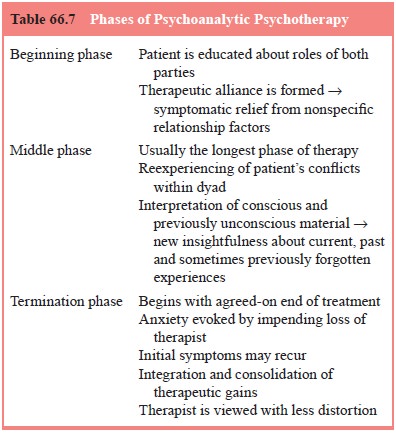Chapter: Essentials of Psychiatry: Individual Psychoanalytic Psychotherapy
Tasks of the Psychoanalytic Psychotherapist
Tasks
of the Psychoanalytic Psychotherapist
What are
the challenges of the psychotherapist in performing psychoanalytic
psychotherapy? First, the therapist must ensure that the patient can feel both
emotionally and physically safe within the therapeutic relationship. This is
accomplished by ac-knowledging the goals of the treatment and defining the role
of the therapist and through establishing professional boundaries. Boundaries
refer to those constant and highly predictable com-ponents of the treatment
situation that constitute the framework of the working relationship. For
example, agreeing to meet withthe patient for a specified amount of time, in a
professional office, and for an established fee are some of the elements of the
profes-sional framework.
Boundaries
also have ethical dimensions best summarized as the absolute adherence by the
therapist to the rule of never taking advantage of the patient: through sexual
behavior; for per-sonal, financial, or emotional gain; or by exploiting the
patient’s need and love for the therapist in any fashion (e.g., by using the
therapy sessions to discuss the therapist’s own problems). The concepts of
neutrality, abstinence and confidentiality further de-fine the role of the
therapist. A critical task of the psychoanalytic psychotherapist is to detect
when a breach in either role or bound-ary has occurred and to restore the
patient’s security through clarifying and interpreting the meaningfulness of
such a breach.
The
explication of a boundary violation is but one spe-cific example of the technique
of interpretation. Successful in-terpretation is based on a number of
prerequisite skills. These include the capacity to empathize with the patient’s
plight, the ability to recognize the meaning of one’s own fantasies about, and
responses to, a patient (countertransference), the ability to maintain the
patient’s verbal flow through the use of open-ended or focused questions, and
the capacity to tolerate a relatively high level of ambiguity within the
therapeutic relationship. One im-portant professional characteristic of the
skilled psychotherapist is patience. Psychotherapy is often arduous, and the
capacity to “stay in the chair” with the patient is critical.
The
identification of repeated patterns of behavior both within the therapy and in
the patient’s outside life is a funda-mental technique in making sense of the
patient’s emotional life. This, of course, involves the appreciation of
transference and the art of knowing how and when to share this recognition with
the patient. Interpretation relies on both appropriate timing and dos-age. That
is, the psychoanalytic psychotherapist must appreciate when the patient can
best integrate the therapist’s observations and must respect the patient’s
defenses, taking care not to over-whelm the patient by insisting that she or he
confront more than is tolerable.
Psychoanalytic
psychotherapy requires the successful en-gagement of the patient and the
establishment of a therapeutic or working alliance. The alliance can be
threatened by a number of phenomena including, but not limited to, the
following
·
The therapist’s countertransferences or other
limitations in his or her capacity to tolerate the emotions stirred by the
patient, resulting in empathic failures and mistakes.
·
The emergence of intense feelings and needs within
the pa-tient, for example, when an accurate well-timed intervention evokes
feelings in relation to the therapist of appreciation and love accompanied by
feelings of vulnerability, erotic desire, or inferiority which the patient
wants to flee.
·
The patient’s being reminded of the existence of
others in the therapist’s life, such as other patients or family (e.g., during
in-terruptions due to the therapist’s vacations), triggering painful and
embarrassing feelings of jealousy and possessiveness.
The
therapist’s ability to appreciate and respectfully to acknowl-edge to the
patient the impact of these temporal events is critical to the progress of
treatment.
All of
the psychotherapist’s skills and techniques must be embedded in a consistent
and coherent theoretical viewpoint that provides the therapist with a framework
to understand the eti-ology and meaning of a patient’s symptoms and
dysfunctional behaviors both in the past and in the present in each of the
phases of psychotherapy (Table 66.7).

This
includes an organized method for understanding the therapist’s unconscious and
conscious responses to the patient as well. It requires that the therapist
listen to the patient’s commu-nications in a manner that is markedly different
from other forms of social discourse. So-called “process communication” speaks
to the therapist on multiple levels and through displacement, through passing
remarks and jokes, through shifts in topics, and through metaphors and symbols.
To assist in understanding com-plicated process communication, psychiatrists
often ask them-selves, Why is the patient telling me this now? What might the
patient be trying to say about his or her uncomfortable feelings? Is something
being said about the therapeutic relationship?
The objective
of this type of treatment is to improve the patient’s quality of life largely
through enhancing interpersonal relationships by promoting greater insight into
perceptual distor-tion and intrapsychic and interpersonal conflict.
Psychoanalytic psychotherapy accomplishes this objective by focusing on the
pa-tient’s current predicaments as manifested in both life activities and
relationship with the therapist. It is at times less concerned with the
analysis of transference and the complete discovery of the underlying genetic
precursors of the patient’s current psycho-logical problems, depending on the
specific clinical situation.
Related Topics